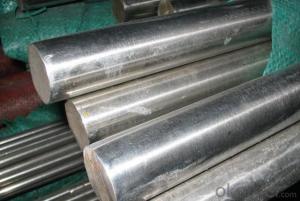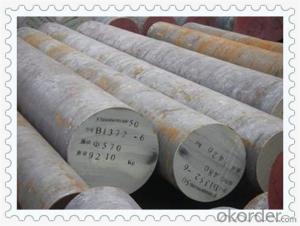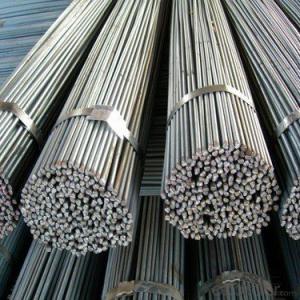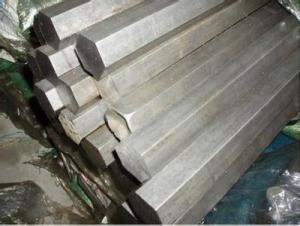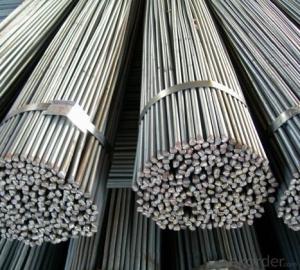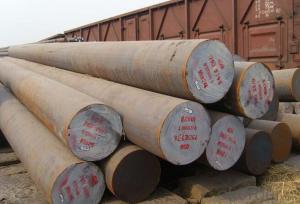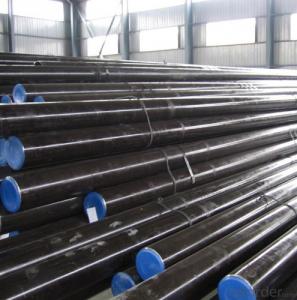Mould Steel Bar H13 Hot Forged Finished
- Loading Port:
- Tianjin
- Payment Terms:
- TT OR LC
- Min Order Qty:
- 25 m.t.
- Supply Capability:
- 50000 m.t./month
OKorder Service Pledge
OKorder Financial Service
You Might Also Like
Specification
Mould Steel Bar H13 Hot Forged Finished
Product Description:
1.The steel is widely used to manufacture hot extrusion dies and mandrels, forging die forging hammer die forging presses, forging machines, mold inserts and alloy die-casting mold.
2.the steel has high hardenability and thermal cracking capacity,good wear resistance,with good heat resistance, in higher temperatures has good strength and hardness, high wear resistance
3.HOT WORK TOOL STEEL ROUND BAR
H13/DIN1.2344 hot work mould steel feature:
Comparable steel:H13(USA,ASTM);DHA1(Datong,Japan);4Cr5MoSiV1(China);1.2344(Germany DIN);SKD61(Japan,JIS)
Chemical Composition:
C | Si | Mn | Mo | V | Cr | P | S | |
0.32~0.42 | 0.80-1.20 | 0.20-0.50 | 1.10-1.75 | 0.80-1.20 | 4.75-5.50 | ≤0.030 | ≤0.030 |
Features of H13 Steel:
1, Hot work tool steel
2, Very good red-hardness with toughnes
3, Tools may be water-cooled in service
4, May be cold-hobbed in the annealed condition
Application:
1, Casting dies for aluminium, magnesium and zinc
2, Extrusion dies and adaptor ring
3, Hot stamping and press forge dies
4, Shear blades for hot work and hot swaging dies
Product Show:
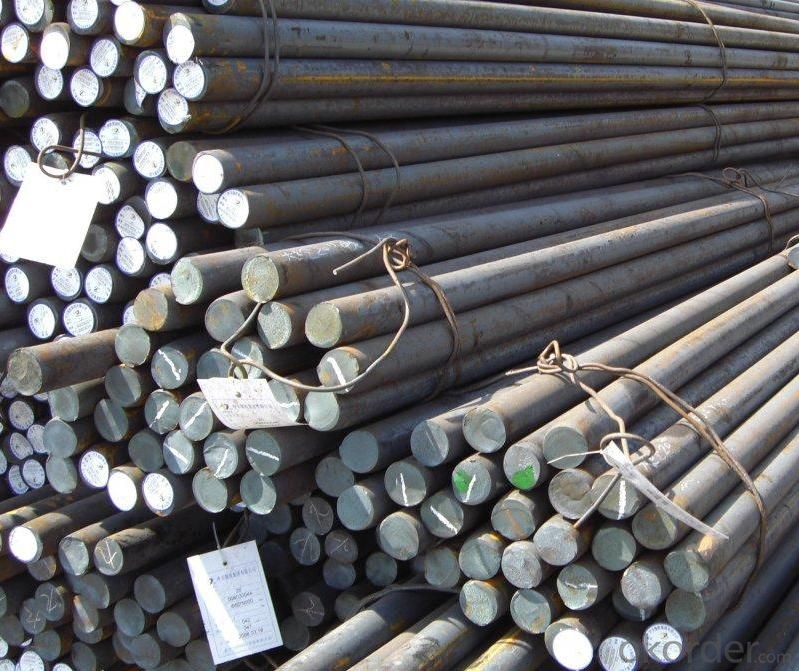
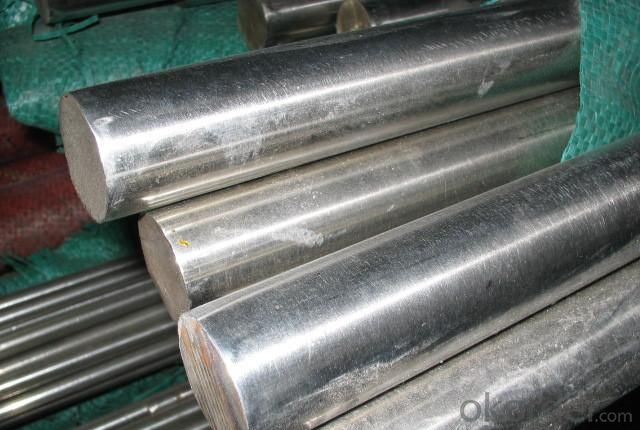
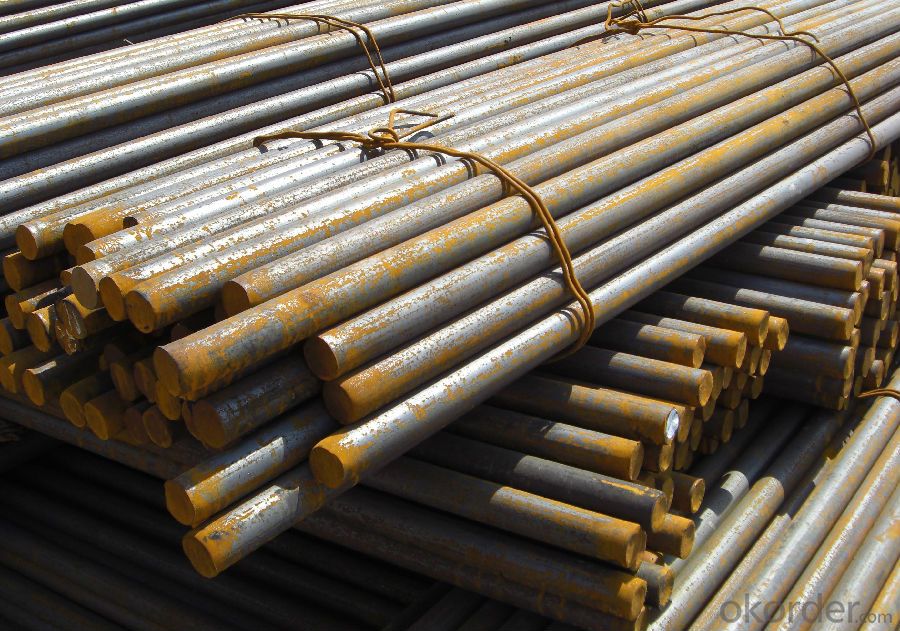
- Q: What are the main factors affecting the wear resistance of special steel?
- There are several main factors that affect the wear resistance of special steel. Firstly, the composition of the steel plays a crucial role. The addition of certain alloying elements, such as chromium, vanadium, and tungsten, can significantly enhance the wear resistance of the steel. These elements form hard carbides or nitrides within the steel matrix, which increase its hardness and resistance to wear. Secondly, the heat treatment process used on the steel greatly influences its wear resistance. Through processes like quenching and tempering, the steel can be hardened to achieve a desired level of wear resistance. The heat treatment also helps in refining the microstructure of the steel, making it more resistant to wear and deformation. Thirdly, the microstructure of the steel is another important factor. The presence of fine grains and a homogeneous distribution of carbides or other reinforcing phases within the steel matrix greatly enhances its wear resistance. Additionally, the presence of retained austenite, a metastable phase, can also contribute to improved wear resistance. Furthermore, the hardness of the steel is a key determinant of its wear resistance. A higher hardness level generally translates to better wear resistance, as it provides resistance against the abrasive forces acting on the steel surface. Lastly, the design and surface finish of components made from special steel also affect their wear resistance. The shape, size, and surface roughness of the components can influence the distribution and magnitude of the contact stresses on the steel, thereby affecting its wear resistance. In conclusion, the wear resistance of special steel is influenced by factors such as its composition, heat treatment, microstructure, hardness, and the design and surface finish of the components. By carefully considering these factors, engineers can optimize the wear resistance of special steel for various applications.
- Q: How does special steel contribute to the renewable energy equipment industry?
- Special steel plays a crucial role in the renewable energy equipment industry by providing the necessary strength, durability, and corrosion resistance required for various components. One of the key applications of special steel in this industry is in wind turbines. Wind turbine towers, blades, and gearboxes are all manufactured using special steel alloys due to their high tensile strength and resistance to fatigue. This enables wind turbines to withstand the harsh environmental conditions and operate efficiently for prolonged periods. Moreover, special steel is also extensively used in the production of solar power equipment. Solar panels are often framed using stainless steel, which offers excellent corrosion resistance and structural stability, ensuring their longevity and performance in outdoor environments. Additionally, special steel alloys are employed in the manufacturing of solar trackers, which enable solar panels to follow the sun throughout the day, optimizing their energy generation potential. In the hydroelectric power industry, special steel is employed in the construction of turbine components, such as blades, shafts, and casings. These components are subjected to high pressures, water flow, and abrasive wear, making the use of special steel essential to ensure their reliability and longevity. Furthermore, special steel is also utilized in the production of energy storage systems, such as batteries and fuel cells. These technologies require materials with high conductivity, corrosion resistance, and mechanical strength, making special steel alloys ideal for their construction. Overall, special steel contributes significantly to the renewable energy equipment industry by providing the necessary strength, durability, and corrosion resistance required for various components. Its utilization in wind turbines, solar panels, hydroelectric power systems, and energy storage technologies ensures the reliability and longevity of these equipment, ultimately promoting the growth and sustainability of the renewable energy sector.
- Q: How does special steel contribute to the agricultural sector?
- Special steel contributes to the agricultural sector in several ways. Firstly, special steel is known for its strength and durability, making it an ideal material for manufacturing various agricultural machinery and equipment. This includes tractors, plows, harvesters, and irrigation systems, among others. These machines require robust and reliable components that can withstand the demanding conditions of agricultural work, and special steel provides the necessary strength and resistance to wear and tear. Additionally, special steel can be used to produce high-quality cutting tools that are essential in farming operations. Implements such as sickles, scythes, and pruning shears need to have sharp and durable blades to efficiently cut through vegetation. Special steel's hardness and strength make it a suitable material for manufacturing these tools, ensuring they retain their sharpness even after prolonged use. Furthermore, special steel can contribute to the agricultural sector by enabling the construction of sturdy and durable infrastructure. Agricultural buildings, storage facilities, and fencing often require strong and corrosion-resistant materials to withstand the elements and protect crops, livestock, and equipment. Special steel, with its resistance to rust and structural integrity, can be used in the construction of barns, silos, sheds, and fencing, providing long-lasting and reliable structures. In conclusion, special steel plays a crucial role in the agricultural sector by providing the necessary strength, durability, and corrosion resistance required for the manufacturing of machinery, cutting tools, and infrastructure. Its properties contribute to improved efficiency, productivity, and reliability in agricultural operations, ultimately benefiting farmers and the overall agricultural industry.
- Q: How does special steel contribute to improving product performance under extreme conditions?
- Special steel contributes to improving product performance under extreme conditions by offering enhanced strength, corrosion resistance, and high temperature stability. Its unique composition and manufacturing processes allow it to withstand extreme temperatures, pressures, and harsh environments, ensuring the reliability and durability of products in challenging circumstances. Additionally, special steel's superior mechanical properties and ability to maintain structural integrity enable it to resist wear, fatigue, and deformation, thus improving the overall performance and longevity of products when exposed to extreme conditions.
- Q: How is corrosion-resistant tool steel used in the production of molds and dies?
- Corrosion-resistant tool steel is commonly used in the production of molds and dies due to its ability to withstand exposure to corrosive environments. This steel helps to prevent rust and degradation, ensuring that the molds and dies maintain their structural integrity and dimensional accuracy over time. By using corrosion-resistant tool steel, manufacturers can produce high-quality molds and dies that are durable and resistant to wear and tear, ultimately improving the overall efficiency and longevity of the production process.
- Q: How does special steel contribute to the aerospace safety?
- Special steel contributes to aerospace safety in several ways. Firstly, special steel alloys such as titanium and stainless steel are used in the construction of critical components like landing gear, engine parts, and structural elements. These alloys offer high strength-to-weight ratios, corrosion resistance, and excellent heat resistance, ensuring the durability and reliability of aerospace structures. Moreover, special steel plays a crucial role in manufacturing precision instruments and tools used in aerospace maintenance and repair. These tools are essential for maintaining the safety and functionality of aircraft, ensuring accurate measurements, and facilitating effective repairs. Furthermore, special steel is utilized in the production of safety-critical fasteners, such as bolts and screws, which hold various aircraft components together. These fasteners need to withstand extreme forces and vibrations during flight, and special steel materials provide the necessary strength and durability to ensure their reliability. Overall, the use of special steel in aerospace applications enhances the safety of aircraft by providing robust and reliable materials for construction, maintenance, and repair, ultimately contributing to the overall integrity and performance of aerospace systems.
- Q: Can special steel be used in the production of springs for watches?
- Yes, special steel can be used in the production of springs for watches. Special steel, such as stainless steel or high carbon steel, is often preferred for watch springs due to its excellent strength, durability, and resistance to corrosion, ensuring reliable and long-lasting performance of the watch.
- Q: What are the main characteristics of corrosion-resistant steel?
- Corrosion-resistant steel, also known as stainless steel, is a type of steel alloy that possesses unique characteristics that make it highly resistant to corrosion. Here are the main characteristics of corrosion-resistant steel: 1. High resistance to corrosion: One of the primary characteristics of corrosion-resistant steel is its ability to resist corrosion. This is achieved through the addition of specific alloying elements, such as chromium, nickel, and molybdenum, which form a protective layer on the surface of the steel. This protective layer, known as the passive layer, prevents the underlying steel from coming into contact with corrosive substances, such as moisture, chemicals, and acids. 2. Excellent durability: Corrosion-resistant steel exhibits exceptional durability, making it suitable for various applications in harsh environments. It can withstand exposure to extreme temperatures, high humidity levels, and corrosive chemicals without deteriorating or losing its structural integrity. This durability ensures that structures made from corrosion-resistant steel have a long service life, reducing the need for frequent maintenance and replacements. 3. Aesthetic appeal: In addition to its functional properties, corrosion-resistant steel also offers aesthetic appeal. Its smooth and polished surface gives it a visually pleasing appearance, making it a popular choice for architectural applications, interior design, and decorative elements. The ability to maintain its appearance over time, without rusting or discoloration, adds to its desirability in both industrial and domestic settings. 4. High strength: Corrosion-resistant steel is known for its high strength and toughness. It retains its mechanical properties even in corrosive environments, allowing it to withstand heavy loads, impacts, and other external forces. This strength makes it suitable for applications where structural integrity and safety are crucial, such as bridges, buildings, marine equipment, and automotive components. 5. Versatility: Corrosion-resistant steel offers versatility in terms of its applications. It can be easily fabricated, welded, machined, and formed into various shapes and sizes, allowing for customization and adaptability. This versatility makes it ideal for a wide range of industries, including construction, aerospace, automotive, chemical processing, and marine. 6. Hygienic properties: Another important characteristic of corrosion-resistant steel is its hygienic properties. Its non-porous surface prevents the growth of bacteria, making it suitable for applications in the food and beverage industry, healthcare facilities, and pharmaceutical manufacturing. The ease of cleaning and maintenance further enhances its hygiene standards. Overall, corrosion-resistant steel combines excellent resistance to corrosion with durability, strength, versatility, and aesthetic appeal. These characteristics make it a reliable and cost-effective material for various industries, ensuring long-term performance and protection against the damaging effects of corrosion.
- Q: How does special steel contribute to the manufacturing of consumer goods?
- Special steel plays a crucial role in the manufacturing of consumer goods by offering superior strength, durability, and corrosion resistance. It enables the production of high-quality products such as automobiles, appliances, cutlery, and tools, ensuring their longevity and performance. The use of special steel enhances the overall quality and reliability of consumer goods, leading to increased customer satisfaction and product longevity.
- Q: How does special steel resist fatigue?
- The durability and strength of special steel are enhanced through the incorporation of specific properties that resist fatigue. The high tensile strength of this steel is a primary factor in its ability to withstand stress and load without deforming or breaking, preventing the initiation and spread of fatigue cracks. In addition, special steel often undergoes heat treatment processes like quenching and tempering to further enhance its fatigue resistance. This alters the steel's microstructure, creating a fine and uniform grain structure that improves its mechanical properties. It increases hardness and toughness, reducing susceptibility to fatigue failure. Furthermore, special steel can be alloyed with elements like chromium, molybdenum, and vanadium to enhance its resistance to fatigue. These elements form carbides and other strengthening phases within the steel, improving hardness, strength, and resistance to fatigue crack propagation. Moreover, specialized surface treatments like shot peening and nitriding can be applied to special steel. Shot peening involves bombarding the steel surface with small metal particles, inducing compressive residual stresses. These stresses counteract the tensile stresses that cause fatigue cracks, thus enhancing fatigue resistance. Nitriding involves diffusing nitrogen into the steel surface, creating a hardened layer that improves wear resistance and, consequently, fatigue resistance. In conclusion, special steel resists fatigue through a combination of factors, including high tensile strength, specific heat treatment processes, alloying elements, and specialized surface treatments. These properties work together to enhance the steel's durability, strength, and resistance to fatigue crack initiation and propagation, making it a reliable and long-lasting material for various applications.
Send your message to us
Mould Steel Bar H13 Hot Forged Finished
- Loading Port:
- Tianjin
- Payment Terms:
- TT OR LC
- Min Order Qty:
- 25 m.t.
- Supply Capability:
- 50000 m.t./month
OKorder Service Pledge
OKorder Financial Service
Similar products
Hot products
Hot Searches
Related keywords
